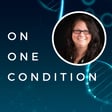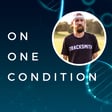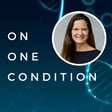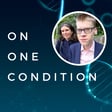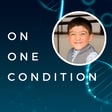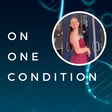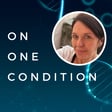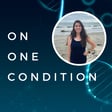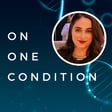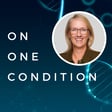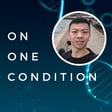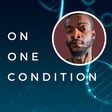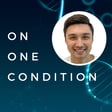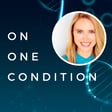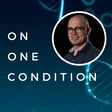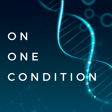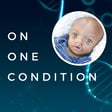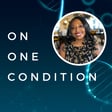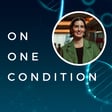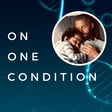Become a Creator today!Start creating today - Share your story with the world!
Start for free
00:00:00
00:00:01

Episode 74: Erika Stariha - SATB2-associated Syndrome
Erika shares her family’s seven-year journey to find a diagnosis for her son, Urban, who was eventually found to have SATB2-associated syndrome. With warmth and candour, Erika explains what it’s like to live through years of uncertainty, to celebrate small milestones, and to help build a global community.
Erika reflects on motherhood, advocacy, and balance – from the early fears of losing her child to the hope and purpose she found through founding the SATB2 Europe Foundation. Her story is one of resilience, love, and an unshakable belief in community and connection.
The song that Erika chose is Ain't No Mountain High Enough by Marvin Gaye and Tammi Terrell.
Transcript
Introduction to 'On One Condition'
00:00:00
Speaker
Hi, I'm Sylvain Bertelot and you're listening to on One Condition, a podcast to raise awareness awareness about health conditions by listening to people who live them every day. My guest today is Erika Starija and we're going to talk about SAT B2 syndrome and her son, Urban.
Meet Erika Starija and Her Journey
00:00:20
Speaker
Hi Erika, I hope I pronounced all of this well. Yes, hello Sylvain, yes, you did well. It's not an easy task to pronounce well Slovenian names. So good job.
00:00:33
Speaker
Thank you. How are you doing? A bit nervous, but otherwise quite well. Thank you. And thank you for inviting me and giving me this opportunity to speak about our journey on your podcast. So Well, thank you for joining.
00:00:49
Speaker
but we're going to talk about Sad B2 and your son, but we've got also some very interesting topics that that go along that, so I can't wait.
Musical Reflection: 'Ain't No Mountain High Enough'
00:00:58
Speaker
As always, I love starting with a song. So which song did you choose and why?
00:01:04
Speaker
Yes, it it is not an easy task for me to choose one song. I normally listen to very dense songs or like a huge variety of music, but...
00:01:15
Speaker
For today and the purpose of this talk, I chose a duet from Marvin Gaye and Tammy Terrell from the 60s. Probably listeners would recall it as, Ain't no mountain high enough.
00:01:31
Speaker
I chose it um because these main verses capture two important things. Like, I would do anything to help my affected child and the community.
00:01:43
Speaker
And there's no mountain high enough to overcome all the barriers
Understanding SAT P2 Syndrome
00:01:48
Speaker
along the way. And on the other hand, to cherish and nurture the the love and the partnership with my husband, which is a challenge in families having a special needs child.
00:02:04
Speaker
And it's not self-evident that this relationship is strong and lasting. So it's really important to to kind of really nurture this relationship because I cannot imagine to deal with all the challenges on my own.
00:02:18
Speaker
Yeah, I'm sure I'm going to talk more about that in a moment. I love that song. I really like it. I'm glad you chose that. So it's probably best to start from the beginning. And how did you realize that you needed to get Urban checked? And how did you discover that he has Sat P2 syndrome?
00:02:44
Speaker
Yeah, so it was a seven-year... long journey actually to get the answers but it started when he was two to three months old when i noticed that something is not quite right although he was born as a normal you nothing was noticed at the time but at two months i noticed that there's still no eye contact He was asymmetrical in movement and in position.
00:03:16
Speaker
Breastfeeding was ah as an issue from the start, but we did manage. And the next really obvious thing was the strabismus. So he couldn't really have their eyes straight. They're going different ways, each eye, especially when he was like three and four months old, when he started to observe ah the surroundings more closely.
00:03:41
Speaker
And that was the time at three months that we went to the pediatrician and said, well, we think something is not okay. And then we started our journey at the ophthalmology clinic and nothing was found.
00:03:55
Speaker
And they thought it should probably be neurological. And then from six months on, we were managed in the neurology department in a university clinic and did a lot of invasive tests as well, because at the beginning there were quite devastating diagnosis in in a picture like leukodystrophy, so progressive neurodegenerative diseases.
00:04:24
Speaker
So that time when we were kind of still hoping everything will be fine because he was not that far behind. And all these other options that he will die, that that period was extremely difficult for waiting for months to get a letter from abroad saying
Community and Support During Diagnosis
00:04:45
Speaker
whatever it's saying. so But this journey lasted for seven years, also having a lot of other invasive tests like muscular biopsy, lumbar puncture, a lot of like five general anesthesia,
00:05:02
Speaker
for MRIs and so. And only in 2020, at the end of the year, they found with whole exome sequencing, a misense mutation in S-Petugine that is responsible for all his challenges.
00:05:18
Speaker
Yes. Wow. So if I understand correctly, you had a lot of tests that ended up ruling out certain diagnoses. But seven years is extremely, extremely long.
00:05:32
Speaker
How did you carry on? How did you feel when you got an undiagnosis after another one? I mean, like I said, the most difficult part was at the early stage because you have high hopes that it will not be that severe, you know.
00:05:49
Speaker
yeah And on the other hand, yeah, they were excluding things that were really terrible, like you will die in early age. So that that time was, i mean, really, really difficult.
00:06:04
Speaker
But later on when we saw that he's, you know, still okay health-wise and that he's progressing slowly but steadily with a lot of work, of course, a lot of therapies.
00:06:17
Speaker
We were less afraid of him, let's say, dying, especially when they ruled out all this potential diagnosis. But still, our future was very uncertain and we were really looking for a psychological support system As a couple as well, he was our firstborn child.
00:06:38
Speaker
It was really difficult to not knowing what the future will be, to decide for another family member, not knowing if it's inherited or not.
00:06:52
Speaker
ah We couldn't act preventively. Like, what can we do to prevent certain things in the future for him? We didn't belong. to any community. I mean, there are several associations for cerebral palsy and you know autism and similar, which we were all partly kind of could find some similarities, but truly no one really understood us.
00:07:16
Speaker
This not belonging was also a problem. And we were kind of stuck, you know, what to do with our family. You were forced to live day by day. And I think in general, this undiagnosed period is not recognized as a big psychological issue i mean in general and i hope this will change in the future of course nowadays more and more diagnoses are much sooner and even in our case i guess if urbana was born like this year or last year we would get a diagnosis within two years max you know
00:07:53
Speaker
This is the the progress that genetic testing is doing nowadays and accessibility. But yes, I would just say that this undiagnosed period was particularly difficult.
00:08:05
Speaker
For us, the diagnosis was then a blessing because we finally got the answers.
Benefits Post-Diagnosis
00:08:12
Speaker
Yeah, if this diagnosis would come very early, when he was one or two years old,
00:08:18
Speaker
I think both of us with my husband would be very devastated as normally parents are nowadays when they got such a diagnosis.
00:08:30
Speaker
But that in our situation, it really opened a new chapter for our life. Okay. ah Going back to undiagnosed states, you said that you don't belong.
00:08:43
Speaker
Why is it important to belong to a certain community? Well, I'm not sure, but I think this is something in human nature that we want to belong, you know, to be part of a a community, to be heard, to be understood, to be, you know, one of similar situation that you're dealing with. I think this is something very naturally inborn in us, I suppose. But also when you become a part of a big family, as a community with rare disease are, kind of a global family, of course you get much more information on the condition itself, what you see...
00:09:25
Speaker
other individuals that are already like in their forties. So you can see, okay, and you can do preventive things. And also this just support, you know, when you share your challenges and then many people respond, oh, we are facing the same and we tried this and that and it helped and it doesn't.
00:09:44
Speaker
And it really makes big difference. Also, if there is no answer to it or like a solution, but just knowing that you're not alone,
00:09:55
Speaker
in this journey. think many times just this being heard and understood makes a big difference. Yeah. Yeah. So with the diagnosis, did you then
Developmental Challenges and Communication
00:10:10
Speaker
get more support? and Was there anything that you could access that you you were not able to access before?
00:10:18
Speaker
Yes, I mean, of course, that there were several outcomes because of a diagnosis. So one, of course, is to to get the information, you know, how to deal with certain challenges, at least roughly, you know, how there's, of course, no cure or targeted treatment yet for our syndrome.
00:10:39
Speaker
We knew that, for example, it's a very small chance that it would happen again. It was estimated in 1% in our case that it can happen with the next pregnancy.
00:10:52
Speaker
um So we said, okay, we're going to take the risk. And so we have another daughter now, three years old. It was a you know a huge relief for us. Still a challenge, but much better than before, not knowing at all.
00:11:07
Speaker
And of course, you get a lot of information that were gathered from At the time, though this condition is fairly new, only in 2013, it was described as a separate entity. So it's very new and there is no clinical consensus guidelines, no treatment. So it's scarce, but ah during the past years, it really is growing evidence and the community is growing. So like in the past four years from...
00:11:41
Speaker
or like five years now, from 200 cases in the world, now we are over 800 in the world. And four are in Slovenia currently that I know of.
00:11:55
Speaker
So yeah, we could also connect locally, which is also very helpful. We just have a reunion with the families this weekend and locally at our home. So that is also an important thing that results from having a diagnosis.
00:12:11
Speaker
Yeah, yeah. So you mentioned symptoms. Could you tell me a bit more about how that presents in Urban? Yeah, so Urban is now already a teenager. He's 12 and a half years old.
00:12:28
Speaker
He has severe developmental delay. He's like, I would say, around two years old in terms of cognition at at the moment. and He's nonverbal.
00:12:39
Speaker
Yet he's one of the most chattiest people I know. So he uses communication device, like AAC, so alternative communication, and around 30 gestures and three words that are the same for the last five years.
00:12:57
Speaker
And among them, there is no mother, mama. yeah So it's just father in our language. It's ATI. So yeah, and there are three words. But with this...
00:13:09
Speaker
He's really able to communicate quite well, especially his needs and his interests. a little bit more difficult to answer our questions, but still he would make conversation all day long. So I guess if he could speak, he would be really, really and chatty. Yes.
00:13:29
Speaker
So that's good. I mean, he's very social. He does have behavioral challenges, probably also due to lack of communication possibilities but also he has some autistic spectrum kind of traits the problem which affects family life as well is poor sleep dental issues are part of the syndrome so that means for every dental procedure that are quite many in the let's say in a lifetime for these children de demands a general anesthesia like
00:14:08
Speaker
any kind of procedure. we We work towards that he could manage and be still and allow to do any, like at least small things in the mouth. But for now, it's it general anesthesia. That's another burden, let's say, for these children and individuals.
00:14:26
Speaker
And behavioral challenges are progress like are more prominent during the puberty. So we are just at the beginning of this phase. So we'll see what happens. But they say that after 20s, things are a little bit better. So hopefully we'll survive this period in between.
00:14:45
Speaker
Yes, so they're quite typical neurodevelopmental syndrome kind of issues. Some ah children also have epilepsy, which Urban luckily doesn't have, or at least not epileptic seizures. He has some epileptic activity in the brain, but not presenting with seizures.
00:15:06
Speaker
Yes, and there are many challenges in schooling and socializing with others. Like in any neurodevelopmental disorder, very similar issues that we that we face.
00:15:18
Speaker
yeah For every progress, you need to work hard to achieve a small milestones. But then when you do, or when he does, we are very, very happy.
00:15:32
Speaker
Which is maybe, you really acknowledge that milestone differently than in a, let's say, a healthy child when it just happens without big effort.
00:15:45
Speaker
So yeah, that's that's a difference, let's say, when you really appreciate small steps that are done. but Sometimes it's hard to see them, especially if there is a plateau for a long time and you really work and nothing happens.
00:16:01
Speaker
So you always have to look back in in a longer period, like one, two years. Okay. Did we move forward? you know, so it's not like from yesterday till tomorrow, but really longer
Long-term Parenting of Special Needs Children
00:16:14
Speaker
periods that you can really see the difference.
00:16:17
Speaker
Yeah. And the communication, I find that incredible that now you have tools for children who are nonverbal to communicate.
00:16:30
Speaker
Is it something that you've had for a long time or is it quite recent? So the alternative communication is not necessarily digital in in this device, which is of course now really amazing, but it starts with...
00:16:46
Speaker
It can start with really simple picture exchange or pointing to pictures or like choosing what it's, they say it's like learning a second language.
00:16:58
Speaker
Basically, it's not something that is naturally there for any of us. So these children has to learn it. And it's a normally quite hard journey at the beginning.
00:17:11
Speaker
because they are forced to not just point on things that are around them, what they want, or bring you to the to the, let's say, the food they want, but you demand from them that they have to use the picture to point what they want, which is an abstract thing, you know, it's not concrete.
00:17:32
Speaker
But with small steps and persistence, at the age of nine, he got this AAC device, here in Slovenia. A specific issue is with the smaller language populations, like Slovenia 2 million.
00:17:50
Speaker
And we don't have all these apps that are in English, Spanish available with children voices. It's just really basic thing that just, we are stuck to basically one software, let's say, and one text to speech program.
00:18:06
Speaker
now but I think in few years this will change with all this AI technology but it's amazing yes I cannot imagine how difficult it was in the past for individuals that were non-verbal but could understand and it's like you someone covers your mouth you know you're not and I think it really reflects how they present with behavioral because this is the only way they can kind of somehow show their feelings or you know frustration that they they are feeling.
00:18:45
Speaker
So yes, this this technology is awesome. some I mean, it really open opens the door. Even for Van, before he had a digital one, he was limited to how many pictures we could put on A3, let's say, page.
00:19:04
Speaker
So he could point But now with folders, subfolders, the the the amount of words is really growing. And now we see how much more he can actually say, you know, that to be fought and understands. And that's amazing. and But he's still limited with the words that we put in, you know.
00:19:26
Speaker
What we did, we put a symbol there that saying, I cannot find the word. So whatever he doesn't find or thinks he has it inside, he can express that. So then we have to think, okay, try to find what you actually want to say.
00:19:44
Speaker
And he's so happy when we add the new words. He's so, so happy that it's incredible. So that really means that this communication is somehow locked you know in them and not their thoughts.
00:19:58
Speaker
And it's we have to make an effort to really bring them out And then they're happy. At least my son is very happy when he can express himself.
00:20:08
Speaker
Yeah. Listening to you, tell me if you don't agree, but I think what people may not realize when you have a child like Urban with special needs is that it's not something that happens like this. And like you mentioned milestones, I look at my children, i think I take a lot of things for granted, which you don't take for granted at all.
00:20:38
Speaker
And it sounds like it's constant evolution and trying to get better and better just by very small steps. Yes, I agree. I mean, that's that's the story of, let's say, almost all families with special needs ah individuals. it's It's a long life marathon.
Creating a Research and Support Foundation
00:20:59
Speaker
and And that's something that was at the beginning also for my husband. Very difficult to accept that we were both used to, okay, this is the goal. We work hard, we achieve it, and that's it, you know.
00:21:12
Speaker
But here, here is really marathon. You're never really sure you're going to get there. But you have to work towards that. You have to have goals, but no expectations that you will actually achieve them, which is very non-human. So you have to have goals.
00:21:30
Speaker
not too high, not too low, but and this is another challenge. But yes, if you are expecting really that you are going to achieve them, then these expectations can really be felt by your child.
00:21:46
Speaker
yeah and And that's not good. So you really have to make it with ease, which is really non-human, but you Every day we are trying to say, okay, yeah, we know we want where we want to be in five years and we work towards that.
00:22:03
Speaker
But even if we don't achieve it, that's fine. And that's very difficult to accept, especially if you're goal-oriented and very ambitious as a person.
00:22:15
Speaker
That's really not something normal to accept. But I guess from my experience, that's the best attitude at the moment. So that you work, but you don't have this pressure inside you that I have to achieve it. Otherwise, the world will collapse, you know.
00:22:36
Speaker
Because children are very sensitive, especially our children, to your emotions and your feelings. And they can feel they're not good enough or they're disappointing you or know And that's that's really not what we want, i guess. Yeah, yeah.
00:22:54
Speaker
Makes sense. So I know that we also want to talk about the what you've done. So after receiving Urban's diagnosis, you ended up creating the European Foundation for SADB2.
00:23:11
Speaker
Could you tell us a bit more about that? Starting maybe with the why. Why did you feel the need to do that? Yes, so my professional background is a clinical pharmacist.
00:23:24
Speaker
And at the time, just before we got the diagnosis, I was still working at a university hospital. But then with the diagnosis, I felt we need to do something.
00:23:36
Speaker
In rare disease, it's like we were the only and the first case at the time in Slovenia. He's still the oldest child with this condition in syndrome syndrome.
00:23:47
Speaker
like identified, let's say. And there was no point of doing a Slovenian national association, which normally you do for, you know, common diseases, um if there is nothing.
00:24:01
Speaker
But I felt, yes, there is a need to really connect European globally, even um for this syndrome. I felt I have enough competencies and enough drive to do that. So I connected with two other parents from Sweden and Austria and we co-founded this Set Between Europe Foundation.
00:24:26
Speaker
And really, so the idea from the beginning, since I was from clinical, let's say, world, was, okay, we need guidelines, you know, we need clinical practice guidelines, how to best manage so that children all all over the world will get, if not optimal, at least the minimum standard of care everywhere that they need, you know.
00:24:49
Speaker
And so this is one important thing that was in our vision and is already undergoing now. And the second was to have a European reference center or center of expertise for this syndrome within European Reference Network.
00:25:06
Speaker
Because it's it's impossible to have in every country expertise for every rare syndrome because there are so many, like 7,000 and more.
00:25:18
Speaker
there It's impossible. So it's important that the knowledge is a little bit concentrated in in one place where they see more patients and then that the local clinicians can get like a a second opinion or advice, official advice from that expert center with the particular issue that they're dealing with their patient here elsewhere.
00:25:41
Speaker
wherever in in Europe. So that was the second big goal. And it's also already half-achieved. I mean, we we established it in in in in the Netherlands, but it's a challenge to like financially and logistically enable for international patients. But that's something that we will not stop and really try to achieve on a European level, that this would work.
00:26:09
Speaker
And then the third and not less important, but really maybe even the most important thing is to drive research towards treatments. And we did so far connected researchers, basic restaurants rep sorry basic researchers, and also the ones that work in translational medicine,
00:26:37
Speaker
that were not connected before. So we identified papers here and there. And then now we have a a network of 15 to 20 researchers that are interested in this and are now also part of our scientific advisory board, some of them, and hosted two virtual roundtables on this topic.
00:27:00
Speaker
And this was the first time they you know met, let's say, online, at least, and share their work and listen to each other and try to to start to think about on the therapeutic avenues. First to, of course, unravel all this quite complex pathophysiology for our syndrome, because this ZB2 gene is very central in brain development.
00:27:25
Speaker
eight It regulates other genes and it's really, really the center of development, I could say, of brain development. And it's not that easy target for these novel treatments like gene therapy.
00:27:41
Speaker
There are quite a lot of challenges to first understand the mechanisms and then find potential treatments. Also with drug repurposing and other ways that we could at least symptomatically help with certain symptoms like sleep, bone issues, behavioral issues, cognitive, of course, and speech.
00:28:06
Speaker
So not necessarily curing for an exercise. This will be more relevant for new generations, but for for our, let's say, already kind of going into adulthood children, already symptomatic treatments that would be more targeted for our condition would be very beneficial to to improve the quality of life all involved.
00:28:32
Speaker
When you started the foundation, did you expect that you would be able to get all those researchers interested in in sharing between themselves?
00:28:44
Speaker
mean, it's something that doesn't necessarily happen that easily or that often. Yeah, it's not easy. It's a long, like now we are four years in this journey and only now we can really show some, let's say, concrete results of all this effort.
00:29:03
Speaker
i don't I don't know how many emails, like a really extreme amount of emails that were sent out. Even for a clinical network, you know, there was like five clinicians that we know of in the world that were kind of seeing SAS patients. And now we have over 70 clinicians in our network for the global clinical guidelines.
00:29:24
Speaker
And
Balancing Advocacy and Personal Life
00:29:26
Speaker
yeah, only now things are something that you can show, But before, we were just working hard and trying to put things together. And yes, especially with the researchers, like basic researchers, this is a competitive environment, you know, and it is a challenge how to encourage them to work together for a common cause.
00:29:51
Speaker
But I think the showing... what they can do, what impact their research can have on a real life, you know, not just on a cell line, but on a real life, what this can change shift for our children, for our families is also the drive that is kind of motivating them yeah to to do to do so, or maybe to go a little bit out of their normal research field how it works so try and yeah of course some are more collaborative some less and it's a challenge and i'm still learning and we are still learning how to deal with all this and they are learning but the goal is very clear so we will not stop easily trying
00:30:44
Speaker
I admire any effort that people take to try to get people who usually work in a competitive and environment to to work together. i love that.
00:30:57
Speaker
And I think what I find interesting in science and in in clinical research in general is that There's this human side which is center of everything, which enables that in a way, that people empathize with the human side so they're more willing to to work together.
00:31:21
Speaker
Indeed. Listening to you again, i feel like you have you've taken on a battle with this foundation, but at the same time you need to look after Urban.
00:31:34
Speaker
You talk about the the importance of having a strong couple. How do you manage to balance everything? Yeah, good question. Balancing is, I think, in every life experience,
00:31:48
Speaker
balance just the right amount of everything at work and you know not work and so on is in general a challenge and for me personally also that is no i'm no exception you can easily when you start such big projects of course all pro bono it's my free decision to do so When you start and then when it starts, like the wheels are turning and people coming together, then you cannot just say, oh, I cannot do this anymore.
00:32:22
Speaker
I mean, you can, but it's really difficult when you already put so much effort and people are now on board. And things are maybe more bigger than you expected or more overwhelming than you expected because you don't know exactly where you're going. You just hope that you will get to the destination. But in the meantime, it can be very overwhelming.
00:32:46
Speaker
I find myself being sometimes guilty that all this time that I'm dedicated now for the community, let's say, and the progress is...
00:32:57
Speaker
not beneficial for Urban at this moment. you know i i'm not Maybe I could focus more on his communicator device or to school system or all these thoughts that I have.
00:33:12
Speaker
Am I doing the right thing for my family? Probably many rare disease or any patient advocate faces similar challenges at certain points and decisions what to do.
00:33:25
Speaker
And then when you see it's too much, then you have to, and I did it along this four years. I did have some periods that I had, okay, this is too much. I have to, it will wait anyway. Nothing will happen. I mean, nothing will, everything will wait for me or for someone that is willing to take the lead.
00:33:48
Speaker
But yes, of course, you want to be as fast as possible to also help my child not waiting too long. So yeah, it's it's a challenge. It also happens that when you are in this journey, many parents get sick for different diseases, a chronic disease or you know whatever, because it's just the way how you pay the toll of all these efforts.
00:34:18
Speaker
And it happens also to me. And when I got the cancer diagnosed two years ago, it was a wake up call. Okay, this is a red flag.
00:34:28
Speaker
So now you have to relax, reduce the amount of work and also to appreciate every day when we are together and also appreciate not just working towards the future, but also ah Spending time with families and family, are my family, ah is really important.
Finding Motivation and Community Support
00:34:54
Speaker
And yeah, sometimes life reminds us if we forgot that on a hard way, sometimes that it does matter. Today also does matter, not just tomorrow.
00:35:07
Speaker
Yeah, and overall... It's like that. So sometimes you can balance better. Sometimes you are, ah again, going over the edge. But we do our best to kind of stay in a safe zone, let's say, for the community and also for my child or my family and myself and myself.
00:35:31
Speaker
Yeah, it's a selfless task, really. So you need to have a lot of dedication and resilience, because if you're not pushing it, I imagine that no one else is pushing it. So do you find it hard to keep going?
00:35:51
Speaker
me yeah Yeah, of course, there are times there it's hard to continue, especially when you have like a difficult diagnosis or something else happens to you or your family.
00:36:02
Speaker
But I'm lucky that I do have now friends and team in SEDB2 Europe that when I'm down, that someone else can at least say a good word to me or encouragement.
00:36:17
Speaker
And then I feel, OK, I'm not alone in this. I'm doing some good things and people appreciate because sometimes just someone saying thank you is enough to keep you going forward.
00:36:31
Speaker
But if this is not that you can hear or get the feedback, then you feel so, what's the point? you know Is the things that we do actually matter or not?
00:36:42
Speaker
So yeah, sometimes a very small thing like saying thank you or someone acknowledging you Or just say, well, don't worry, it will wait, or we will do it instead of you. Or something like that can kind of drag you out of the the whole black hole that you are not sure whether to continue or not, or you don't find the energy to continue.
00:37:06
Speaker
But for myself, the just thank you makes the difference. Yeah. Yeah. Yeah. Knowing that people appreciate what you're doing.
00:37:19
Speaker
ah she Yeah. yeah that That it does matter to the community, let's say. Yes. I have one last question for you. And you decide if you answer for yourself or for all, man, or for the two of you, it's up to you.
00:37:37
Speaker
What's your happy place? The place where you feel at peace? Yeah, I will answer for me because Urban's happy place is everywhere where we are, actually. I he's a very happy child and he just enjoys the company and especially his little sister.
00:37:54
Speaker
So it would be difficult to save one particular place for him. But for me, and my happy place is in the mountains, especially in snowy mountains with skis on my feet and snowing.
00:38:07
Speaker
making first tracks on a freshly groomed snow. That's, that's the the happy place for me. ah yeah And I'm happy and grateful that with hard work now I can share this happy place also with my son and with my family.
00:38:26
Speaker
So winter time and skiing is amazing. something that I look forward the whole year long. So it's really one of the happiest places that I really recharge my batteries and reconnect with myself and the the nature. so Nice. I can picture it.
00:38:49
Speaker
I can hear the noise of the snow and the skis as well. yeah When you see from the chairlift your tracks and being the first one, it's Yeah. It's a little bit magical.
00:39:02
Speaker
Yeah. Yeah. Well, thank you so much, Erica. Truly. i find it admirable what you're doing. And I know you said that you need people to, you need reminders that people appreciate what you're doing. Yeah.
00:39:20
Speaker
I think what you're doing is is changing science for the future, for SAD-B2, and families in the future will really benefit from it. So, yeah, keep going.
00:39:35
Speaker
It's incredible. Thank you, Silvan. Thank you. I appreciate it.
